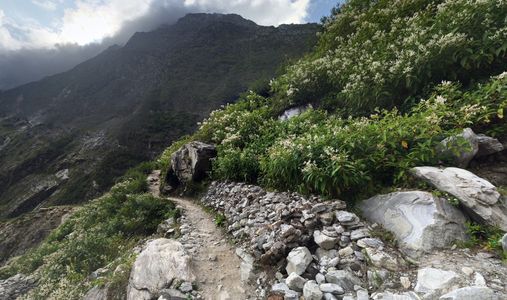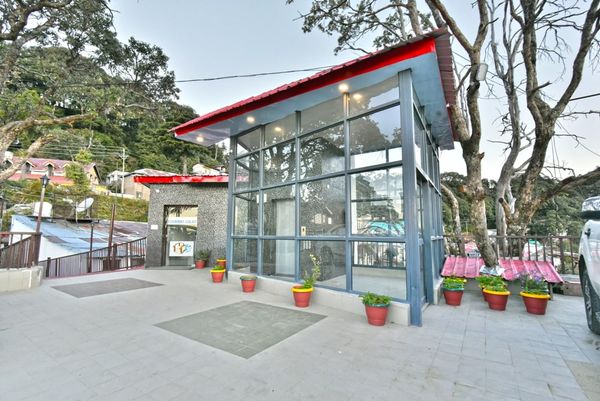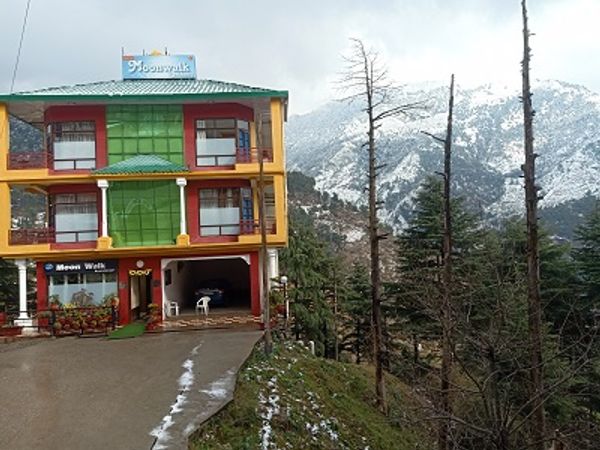Gear Guide for a Rainy-Season Trek to the Valley of Flowers
 Deepanshu Travel
22 Jul, 2025
10 mins read
22
Deepanshu Travel
22 Jul, 2025
10 mins read
22

The Valley of Flowers is a popular trekking destination in Uttarakhand, India. Known for its beautiful meadows filled with wildflowers, this place becomes a magical spot during the rainy season. However, trekking during the monsoon months requires careful planning and the right gear to stay safe and comfortable. This guide will help you pack the right items for a successful and enjoyable rainy-season trek to the Valley of Flowers.
Best Time to Visit the Valley of Flowers
The Valley of Flowers opens in June and remains accessible until early October. The peak bloom happens between mid-July and August. This is also when the region receives the most rain. If you plan your trek during this time, you must be ready for wet and slippery conditions. Proper gear will make your journey easier and safer.
Importance of the Right Gear in Rainy Season
Rain can make trekking difficult. Slippery paths, wet clothes, and cold winds can quickly drain your energy. The right gear protects you from rain, keeps you warm, and helps you walk safely. With good planning, even a rainy trek can be a beautiful and memorable experience.
Clothing Essentials for the Valley of Flowers Trek
Waterproof Jacket and Pants
A high-quality waterproof jacket is the most important item in your bag. Make sure it has a hood and covers your waist properly. Pair it with waterproof pants to protect your lower body. These clothes should be lightweight and breathable to keep you dry without making you sweat.
Quick-Dry T-Shirts and Base Layers
Carry quick-dry T-shirts made of polyester or synthetic fabric. Avoid cotton as it holds water and takes a long time to dry. Carry at least three to four T-shirts so you always have something dry to wear. Base layers are also important for colder days.
Insulating Layer
Even during summer, the mountains can be cold. Pack a fleece or lightweight down jacket for extra warmth. It will help you stay comfortable in higher altitudes and during early mornings or evenings.
Trekking Pants
Bring two to three pairs of comfortable trekking pants. Choose pants that are stretchable and quick-drying. Zip-off pants that convert into shorts are useful but not necessary.
Innerwear and Socks
Carry enough innerwear for the number of days you are trekking. Wool or synthetic socks are better than cotton as they dry faster and keep your feet warm. Pack at least three to four pairs of socks.
Footwear for Rainy Treks
Waterproof Trekking Shoes
Good shoes are essential for any trek. Choose waterproof trekking shoes with a strong grip. The trail to the Valley of Flowers gets slippery during rain, so your shoes must prevent you from slipping. Break in your shoes before the trek to avoid blisters.
Gaiters
Gaiters cover your ankles and lower legs, protecting them from mud, water, and leeches. They also help prevent small stones from entering your shoes. Gaiters are not mandatory, but they are very useful during the rainy season.
Extra Footwear
Carry a pair of sandals or floaters for use around the campsite. After a long day of trekking, it feels good to remove your shoes and relax your feet.
Rain Protection Gear
Poncho or Rain Cover
Along with a rain jacket, carry a poncho or backpack rain cover. This will keep your bag and clothes dry. Ponchos are large and can cover both you and your bag, which is helpful during heavy rainfall.
Plastic Bags and Dry Sacks
Use plastic bags or dry sacks inside your backpack to keep your clothes and electronics dry. Pack each item separately so if one bag gets wet, the rest stay safe.
Umbrella
A small, foldable umbrella can be useful during light rain when you are not trekking steep trails. It is a personal choice but can offer quick protection.
Backpack and Packing Tips
Backpack Size
A backpack of 40 to 50 liters is enough for this trek. Make sure it has good back support and padded shoulder straps. A rain cover for the backpack is a must.
Packing Strategy
Pack heavy items at the bottom and closer to your back. Keep rain gear and snacks in the top or side pockets for quick access. Use plastic bags to separate clean and dirty clothes.
Sleeping Gear
Sleeping Bag
Most guided treks provide sleeping bags, but if you are trekking on your own, bring a lightweight sleeping bag suitable for cold and wet weather.
Sleeping Mat
If your trek does not include tent setup, carry a compact sleeping mat to stay dry and warm during the night.
Personal Items
First Aid Kit
Always carry a basic first aid kit with bandages, antiseptic cream, painkillers, and personal medicines. Include tablets for cold and stomach issues.
Toiletries
Bring biodegradable soap, toothbrush, toothpaste, toilet paper, and hand sanitizer. Wet wipes are useful for freshening up when you cannot take a bath.
Towel
Carry a quick-dry microfiber towel. It is compact and dries much faster than a regular towel.
Electronics and Essentials
Power Bank
There may be limited charging points in the mountains. Carry a power bank to keep your phone charged.
Headlamp or Torch
A headlamp is better than a torch as it keeps your hands free. Carry extra batteries just in case.
Camera and Protection
If you are carrying a camera, keep it in a waterproof case or use silica gel packets to prevent moisture.
Trekking Accessories
Trekking Pole
A trekking pole provides balance on wet trails. It reduces stress on your knees and helps during steep climbs or descents.
Water Bottle or Hydration Pack
Carry at least one liter of water. A hydration pack is handy, but bottles are fine too. Drink plenty of water even if you do not feel thirsty.
Snacks and Energy Bars
Carry dry fruits, chocolates, and energy bars to keep your energy up during long walks.
Documents and ID Proof
Always carry a government-issued ID proof. You may also need permits for the Valley of Flowers trek, so check in advance. Keep photocopies in a waterproof bag.
Final Tips for a Rainy Trek
Check the weather forecast before starting your journey. Always inform someone about your travel plans. Walk carefully on wet paths and take regular breaks. Respect nature and do not litter. Carry your waste back with you.
Conclusion
Trekking to the Valley of Flowers during the rainy season is a unique and beautiful experience. With the right gear and preparation, you can enjoy the lush greenery, blooming flowers, and mist-covered trails. Pack wisely, stay dry, and enjoy one of the most scenic treks in India.
Written By:
Deepanshu Travel



Hotels at your convenience
Now choose your stay according to your preference. From finding a place for your dream destination or a mere weekend getaway to business accommodations or brief stay, we have got you covered. Explore hotels as per your mood.





